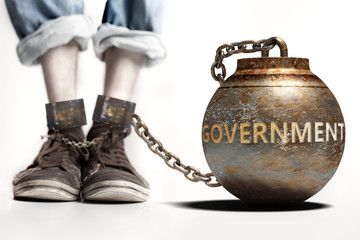This article was originally published by Joshua Mawhorter at The Mises Institute.
EDITOR’S NOTE: Considering government IS slavery, this shouldn’t be too difficult of a concept to grasp. Anyone with “authority” over is a master, and the one obligated to obey or face punishment is a slave. Mental slavery is still slavery.
Given America’s history with slavery and eventual emancipation, especially the Emancipation Proclamation and the Thirteenth Amendment, the average person might be left with the impression that slavery was only ended thanks to the efforts of a powerful nation-state. In fact, one might even go as far as to assume that slavery could only be brought to an end through government policy and enforcement.
What this misses is the important fact that governments were key enforcers of slavery such that slavery could never have expanded and remained to the extent it did absent government policies and enforcement. In fact, while slavery has sometimes been ended by positive law and enforcement against it, it was largely eradicated by government’s non-enforcement of the slavery system.
Slavery is an ancient institution, common to all cultures. Of course, slavery in multiple forms has existed for millennia of human history. It is true that slavery could, would, and has existed absent the political state, however, the state was necessary to socialize, maintain, and enforce the slave system through the coercive legal apparatus.
Slavery, largely because of its high enforcement costs, was always vulnerable to cronyism. Politically-connected elites, as they often do, sought to privatize their gains and socialize their losses. In other words, how could slaveholders shift the economic burden off of themselves and onto others? The answer is that the only way this could be achieved was through employing the legal and coercive apparatus of government to enforce the system. This benefitted the slaveholders at the expense of everyone else.
Writing in his Cronyism: Liberty versus Power in Early America, 1607-1849, Patrick Newman observes the following about the beginnings of African slavery in America,
Significantly, planters also augmented the business of corrupt African chieftains involved in the slave trade. The labor system required a panoply of subsidies to stop escaping and revolting slaves. Among others, the colonies conscripted patrols to catch runaways and put down rebellions, regulated slave meetings and travels, required the return of fugitive slaves, and restricted voluntary manumissions. England assisted by incorporating the Royal African Company with a monopoly over African land and the slave trade. Colonial feudalism, from the land grants to the coerced workforce, embodied cronyism. (emphasis added)
From the beginning, slavery as we think of it, had to be propped up by the government via cronyism—corrupt use of the government apparatus to benefit private individuals or companies at the expense of others. The non-slaveholding population had to be forced to subsidize the enforcement of the slave system. Without this, the overall slave system would have been severely weakened.
How the slaveholders, via the government, forced non-slaveholders to subsidize slavery was usually through a few methods—slave patrols, fugitive slave laws, manumission restrictions, and propping up of the slave trade.
Slave Patrols
Subsidization was needed in the form of slave patrols to catch escaped slaves, suppress slave revolts, regulate slave meetings and passes. Because of the increased costs of enforcing slavery, the slaveholding elite externalized the costs of enforcement by requiring most white males to participate in slave patrol duty. These were established in every slave state. Non-slaveholding whites were legally responsible to enforce black codes, apprehend runaways, monitor pass requirements, break up large gatherings, etc. This required the expense of time, energy, money, and resources. This burden was paid by the non-slaveholding taxpayer. According to pro-slavery theorist George Fitzhugh, these conscripted patrollers were essential to the integrity of the maintenance of the slave system,
The poor…constitute our militia and our police. They protect men in possession of property, as in other countries; and do much more, they secure men in possession of a kind of property [slaves] which they could not hold a day but for the supervision and protection of the poor. (italics added)
Alan L. Olmstead and Paul W. Rhode, historians critiquing the “New History of Capitalism,” explain, “Slave owners created a police state that benefited a small elite at the expense of blacks and poor whites.”
Fugitive Slave Laws
A second way governments enforced the subsidization of slavery by the non-slaveholders was through fugitive slave laws. This example is even seen in the Constitution itself. In fact, it was a chief issue in the growing sectional conflict that led to the Civil War. In this case, simply, the national government required the return of escaped-fugitive slaves by free states. Free states, where slavery was illegal, were required by federal law(s) to subsidize and enforce slavery. Again, writes Newman in Cronyism,
Slavery survived, not because of technological advancements related to agriculture, but because of the nationalizing Constitution and its fugitive slave clause (along with the 1793 Fugitive Slave Act) that socialized enforcement costs and made it harder for slaves to escape. State regulations buttressed the fugitive slave clause, most notably mandatory slave patrols composed of poor white men.
Obviously, absent fugitive slave laws, it was understood that slavery would be severely weakened. In fact, this reality, despite fugitive slave laws, caused slavery to collapse in Brazil. One of the compromises at the Philadelphia Convention (1787) was the Fugitive Slave Clause (Art. IV, Sec. 2, Clause 2). If slave states were going to join in a stronger union with free states, then national law must require that the free states return escaped slaves. Ironically, the states in which slavery was illegal would have to help enforce slavery under the federal government and the Constitution. This issue, and the nullification of it by free states, would heighten sectional tension until the 1860s.
This was why some of the most radical abolitionists even supported secession, because it would then free the free states from the federal obligation to the Constitution and any other federal fugitive slave laws. For example, the abolitionists stated during the antebellum period, “Resolved, That the Abolitionists of this country should make it one of the primary objects of this agitation to dissolve the American Union.” William Lloyd Garrison, founder of the abolitionist newspaper The Liberator, viewed the constitutional protections of slavery as essential to the system, therefore, he believed that secession would free the free states from the obligation to enforce slavery. He wrote,
I tell you our work is the dissolution [separation] of this slavery-cursed Union, if we would have a fragment of our liberties left to us!… By the dissolution of the Union we shall give the finishing blow to the slave system;… (italics added)
From the opposite end of the spectrum, Alexander Stephens—vice president of the Confederacy—even admitted, “I consider slavery much more secure in the Union than out of it.” Whether or not this was empirically true, it is clear that Stephens, and many others, understood that by secession they were forfeiting the US federal government apparatus to enforce slavery.
Manumission Restrictions
One obvious question arises whenever discussing slavery: why didn’t slaveholders simply free the slaves? While there were many reasons why this was the case, it should be recognized that governments made laws that restricted the voluntary freeing of slaves. Simply, the government(s) made it legally harder to free slaves.
In addition to laws that forbade unlicensed slave meetings, gun control laws against free and enslaved blacks, the death penalty without benefit of clergy for conspiracy, and other laws, the Virginia legislature restricted voluntary manumission—freeing slaves. Murray Rothbard writes in Conceived in Liberty, “Moreover, even voluntary manumission of slaves by masters was restricted by the legislature and approval was required by the governor and the Council.” In other words people had to get the government’s permission—governor and Council—to free slaves.
The online Encyclopedia Britannica states that manumission was comparatively difficult in the American South—manumission was even forbidden in South Carolina (1820), Mississippi (1822), Arkansas (1858), and Maryland and Alabama (1860). Another online encyclopedia similarly explains, “On the eve of the Revolution, voluntary manumission was illegal in most of the South, and even where it was permitted, the practice was not common.”
Though many slaveholders would not have taken advantage of the opportunity to free their slaves voluntarily, had the manumission laws been eased, it is reasonable to assume that more slaves probably would have been freed than otherwise. The late economist Walter E. Williams used to point out that when there is a law restricting something—segregation laws, manumission, minimum wages, etc.—then that must imply that, absent the legal restriction, more of that restricted activity would occur than otherwise or there would be no need for the restriction.
Constitutional Slave Trade Subsidy
Another compromise made to gain agreement to the Constitution was a direct grant to slave importers and traders—the Slave Trade Clause (Art. I, Sec. 9). This subsidy required that Congress could not prohibit “importation” of persons by federal law for 20 years—until 1808. Fortunately, all states except South Carolina made laws to end the Atlantic slave trade, however, unfortunately, this also served as a market restriction that bolstered the domestic slave trade and artificially increased the prices of domestic slaves.
Thankfully, slavery did come to an end in the United States officially in 1865 through the 13th Amendment and several states had already put slavery on the road to extinction before that. Since it violates self-ownership and individual rights, kidnapping and slavery are crimes. That being said, we should not forget that slavery was largely socialized, maintained, and enforced by governments. Instead of being protectors from slavery by law and policy, governments have historically been enforcers of slavery by policy, getting non-slaveholders to pay for it.
Read the full article here




